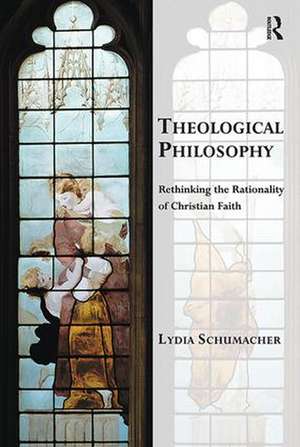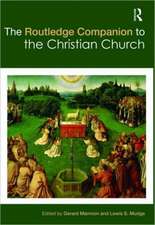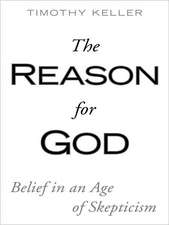Theological Philosophy: Rethinking the Rationality of Christian Faith: Transcending Boundaries in Philosophy and Theology
Autor Lydia Schumacheren Limba Engleză Paperback – 12 feb 2018
| Toate formatele și edițiile | Preț | Express |
|---|---|---|
| Paperback (1) | 436.14 lei 6-8 săpt. | |
| Taylor & Francis – 12 feb 2018 | 436.14 lei 6-8 săpt. | |
| Hardback (1) | 1004.20 lei 6-8 săpt. | |
| Taylor & Francis – 9 dec 2015 | 1004.20 lei 6-8 săpt. |
Din seria Transcending Boundaries in Philosophy and Theology
-
 Preț: 411.81 lei
Preț: 411.81 lei -
 Preț: 411.64 lei
Preț: 411.64 lei -
 Preț: 414.32 lei
Preț: 414.32 lei -
 Preț: 386.39 lei
Preț: 386.39 lei -
 Preț: 462.81 lei
Preț: 462.81 lei -
 Preț: 385.47 lei
Preț: 385.47 lei -
 Preț: 469.34 lei
Preț: 469.34 lei -
 Preț: 469.34 lei
Preț: 469.34 lei -
 Preț: 382.36 lei
Preț: 382.36 lei -
 Preț: 415.24 lei
Preț: 415.24 lei -
 Preț: 384.86 lei
Preț: 384.86 lei -
 Preț: 389.38 lei
Preț: 389.38 lei - 17%
 Preț: 258.14 lei
Preț: 258.14 lei -
 Preț: 409.51 lei
Preț: 409.51 lei - 13%
 Preț: 309.63 lei
Preț: 309.63 lei -
 Preț: 386.39 lei
Preț: 386.39 lei -
 Preț: 363.00 lei
Preț: 363.00 lei - 18%
 Preț: 844.81 lei
Preț: 844.81 lei -
 Preț: 442.07 lei
Preț: 442.07 lei -
 Preț: 382.75 lei
Preț: 382.75 lei
Preț: 436.14 lei
Nou
Puncte Express: 654
Preț estimativ în valută:
83.45€ • 87.38$ • 69.22£
83.45€ • 87.38$ • 69.22£
Carte tipărită la comandă
Livrare economică 09-23 aprilie
Preluare comenzi: 021 569.72.76
Specificații
ISBN-13: 9781138549142
ISBN-10: 1138549142
Pagini: 224
Dimensiuni: 156 x 234 x 18 mm
Greutate: 0.45 kg
Ediția:1
Editura: Taylor & Francis
Colecția Routledge
Seria Transcending Boundaries in Philosophy and Theology
Locul publicării:Oxford, United Kingdom
ISBN-10: 1138549142
Pagini: 224
Dimensiuni: 156 x 234 x 18 mm
Greutate: 0.45 kg
Ediția:1
Editura: Taylor & Francis
Colecția Routledge
Seria Transcending Boundaries in Philosophy and Theology
Locul publicării:Oxford, United Kingdom
Cuprins
Introduction; Pre-conditions for theological philosophy; Necessary conditions for theological philosophy; Christian creedal reasoning I: creation and fall; Christian creedal reasoning II: redemption and Church; Sufficient conditions for theological philosophy; Consequences of theological philosophy; Towards a Trinitarian philosophy
Notă biografică
Dr Lydia Schumacher is Chancellor's Fellow at the University of Edinburgh, School of Divinity. Her previous books include Divine Illumination: The History and Future of Augustine’s Theory of Knowledge and the three-volume Oxford Guide to the Historical Reception of Augustine, for which she served as both co-editor and contributor.
Recenzii
"Luminously clear, stunningly thought-provoking, wonderfully constructive - this work draws contemporary religious thought towards the very heart of reality, where existence and understanding and love are all one. Philosophers, theologians, and ethicists of many schools and many levels of expertise will be excited to behold something we all somehow knew must be so, but had never yet quite seen for ourselves."
- Mark A. McIntosh, Loyola University of Chicago, USA
"This is an impressive, creative, and highly original piece of theological work. It makes an important contribution to apologetics and the on-going debates about faith and reason. I would recommend it to anyone who is interested in apologetics and the philosophy of religion."
- Yonghua Ge, Beijing Normal University
"We are treated to an admirably clear, jargon-free, and normative (rather than merely historically descriptive) exposition of a characteristically ancient and medieval thought about the essentially God-directed nature, purpose, and function of human rational capacities."
- Sameer Yadav, Westmont College
- Mark A. McIntosh, Loyola University of Chicago, USA
"This is an impressive, creative, and highly original piece of theological work. It makes an important contribution to apologetics and the on-going debates about faith and reason. I would recommend it to anyone who is interested in apologetics and the philosophy of religion."
- Yonghua Ge, Beijing Normal University
"We are treated to an admirably clear, jargon-free, and normative (rather than merely historically descriptive) exposition of a characteristically ancient and medieval thought about the essentially God-directed nature, purpose, and function of human rational capacities."
- Sameer Yadav, Westmont College
Descriere
For much of the modern period, theologians and philosophers of religion have struggled with the problem of proving that it is rational to believe in God. Drawing on the thought of Thomas Aquinas, Theological Philosophy seeks to overturn the longstanding problem of proving faith's rationality and to establish instead that rationality requires to be explained by appeals to faith. Building on a constructive argument developed in a companion book, Rationality as Virtue, Lydia Schumacher advances the conclusion that belief in the God of Christian faith provides an exceptionally robust rationale for rationality and is as such intrinsically rational.












